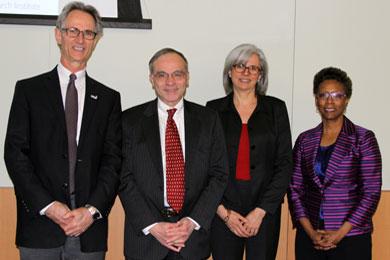PCORI Chief Says Patient-Centered Health Decisions Becoming More Prevalent
The new institute helps patients, caregivers, and clinicians make better-informed health care decisions, says School of Pharmacy’s Pumpian lecturer.

By Steve Berberich
April 2, 2013
“If I’ve learned one thing at PCORI, it’s that there are a lot of motivated patients out there,” executive director Joe V. Selby, MD, MPH, of the Patient-Centered Outcomes Research Institute said at the University of Maryland School of Pharmacy on March 29.
Selby delivered the School’s annual Paul A. Pumpian Memorial Lecture, “An Evolving Understanding of Patient Participation in Clinical Research.” He emphasized that, “We live in an era when the patient is elevated.”
PCORI was established by the federal Affordable Care Act of 2010 as a non-governmental, nonprofit organization. According to Selby, it was long overdue. The institute’s goal is to help patients, their caregivers, and clinicians make better-informed health care decisions.
Selby explained that the institute operates by funding research that will potentially help give patients a better understanding of the prevention, treatment, and care options available, and the science that supports those options.
The institute is rooted in comparative effectiveness, a research approach that came into vogue around 2009 and “addresses very practical questions,” said Selby. Comparative effectiveness means research that considers a full range of outcomes, considering, for example, how possible differences in treatments occur in patient subgroups such as genders, races, and ages.
“This has not been a big part of research until PCORI,” said Selby. “But still, research planning needs patient-centered outcome studies. If PCORI generates better evidence, we have a chance to get to better decisions and [health care] cost-cutting. Where you provide good evidence you get better outcomes, and sharing evidence with patients empowers them.”
PCORI has approved 25 funding contracts nationwide, totaling $40.7 million aimed at supporting patient-centered comparative clinical effectiveness research projects. One of the first PCORI contracts funded a study last year at the University of Maryland, Baltimore (UMB), headed by C. Daniel Mullins, PhD, a professor of pharmaceutical health services at the School of Pharmacy. A coalition of faculty of the School and their UMB colleagues at the School of Medicine and the School of Nursing, plus civic, religious, and educational leaders in the Baltimore region, provided a groundbreaking report to the agency on ways and means of “Integrating Patients’ Voices in Study Design Elements.” The group reported ideas and data from dozens of focus groups of caregivers and patients of different medical conditions, which were aimed at encouraging medical researchers to include “hard-to-reach” patients in future studies and clinical trials.
(Above from left, leaders in the patient-centered movement: Gloria Reeves, MD, assistant professor for child psychology, UM School of Medicine; Selby; Mullins; and Karen Kauffman, PhD, CRNP-BC, associate professor, UM School of Nursing.)
Selby said such data gathering is helping PCORI build an informational comparative effectiveness infrastructure. He said although the agency is still casting a wide net for suggestions, “as we now move into more focused research, we hope to include all the past research results.” He said PCORI has begun to set firmer priorities. The first “targeted research” topics are uterine fibroids, severe asthma, elderly falls, and back pain. The list will grow, he said.
Selby began his Pumpian lecture by crediting its namesake, the late Paul A. Pumpian, as a pioneer in patient-centered pharmacy decisions. Pumpian was a School of Pharmacy graduate in 1950 and earned a JD from the University of Maryland School of Law in 1953. Later, he was the highest-ranking pharmacist at the U.S. Food and Drug Administration.
“For the notion of involving patients, Pumpian was the first I knew to do patient-medication profiling,” said Selby. “He understood that that was important. So, I am so enthusiastic about speaking here for the Pumpian lecture because Paul Pumpian laid part of the foundation for [modern] pharmacy patient practices.”



